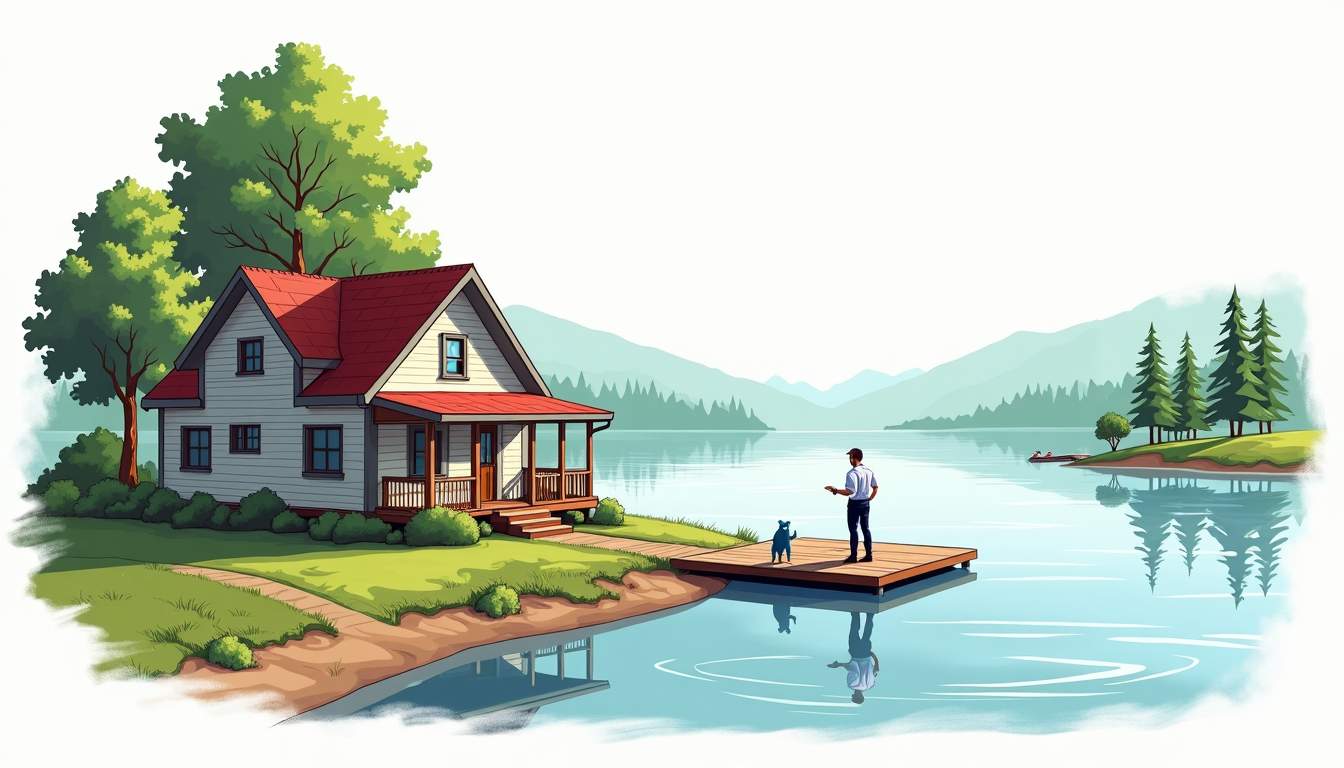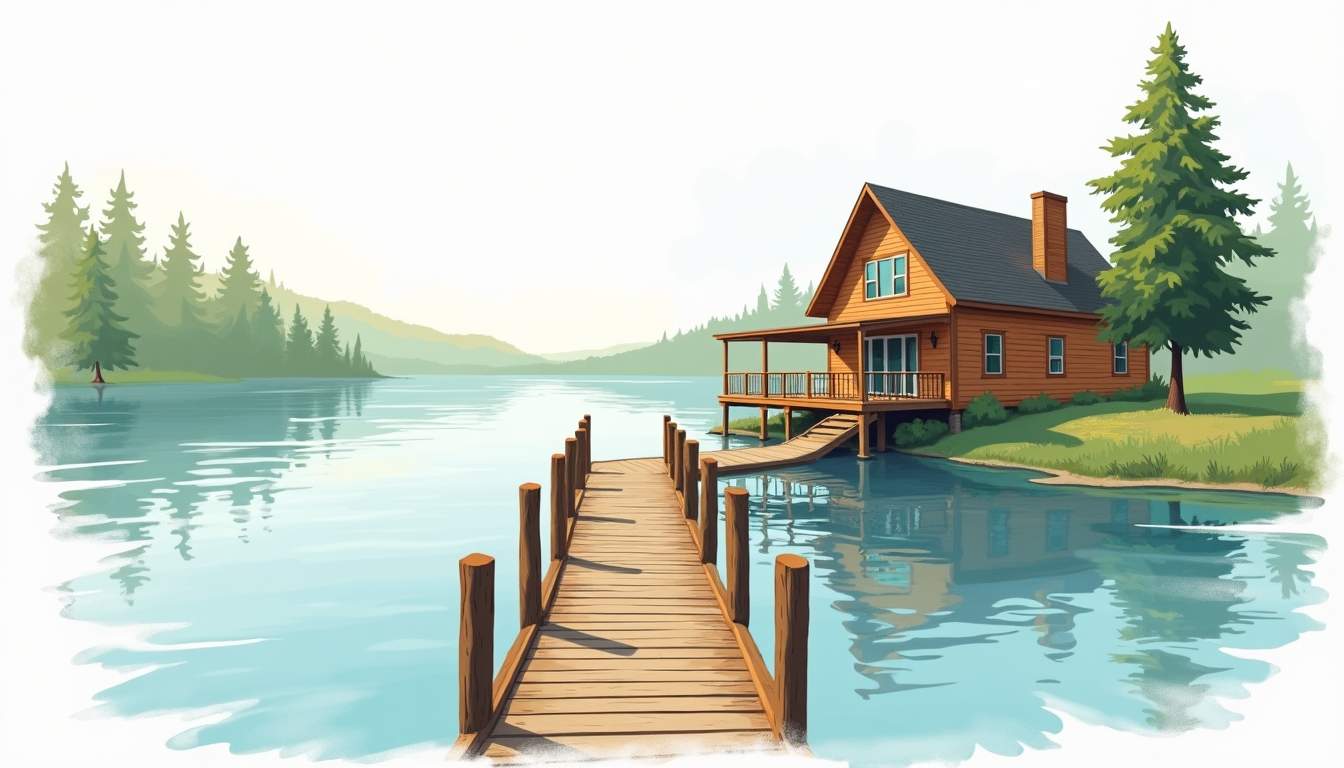
Lakefront living in East Tennessee blends the region’s rolling foothills, clear water, and a culture that values outdoor time and quiet evenings on a private dock. For buyers seeking a year-round residence, a vacation retreat, or an investment rental, properties with private docks are some of the most sought-after listings. This article explores the lakes, neighborhoods, buying considerations, and lifestyle factors that matter when shopping for East Tennessee lakefront homes with private docks.
East Tennessee is a unique mix of Appalachian scenery, accessible metropolitan centers like Knoxville and Chattanooga, and a network of reservoirs and natural lakes. Seasonal temperatures are moderate compared with many northern lake regions, extending the time families can enjoy boating, fishing, and waterside living.

The local culture places a premium on outdoor recreation. Residents enjoy fishing tournaments, boating events, and community gatherings. Proximity to state parks, trails, and scenic drives makes it easy to blend lake life with hiking and exploring historic towns.
Moreover, East Tennessee's lakefront communities offer a welcoming atmosphere with a strong sense of community. Local farmers’ markets, artisanal shops, and lakeside cafes provide a charming backdrop to daily life, offering both residents and visitors a taste of authentic Appalachian hospitality. The region’s rich history, reflected in nearby museums and preserved landmarks, adds depth to the peaceful, nature-centered lifestyle.
For those seeking a balance between tranquility and convenience, East Tennessee's well-connected roadways and growing infrastructure ensure easy access to major highways and airports. This makes weekend getaways and long-term stays equally appealing, opening doors for people looking to invest in vacation homes or relocate to a scenic yet practical environment.
Several lakes in East Tennessee offer properties with private docks. Each lake has its own character, amenities, and real estate patterns, so choosing a lake often begins with lifestyle priorities.
Norris Lake is known for clear water, deep coves, and a long shoreline with many private docks. The lake spans a vast area with homes ranging from modest cabins to luxury estates. Norris attracts buyers looking for privacy, water sports, and year-round boating thanks to its stable water levels.
Fort Loudoun and Tellico Lake are both accessible from Knoxville and blend convenience with waterfront living. Tellico has a community-oriented feel, often with golf courses and planned neighborhoods. Fort Loudoun provides a quick commute to the city along with community marinas and private dock options.
Douglas Lake, with its sprawling shoreline and island-like peninsulas, appeals to anglers and families who value coves and quiet water. Cherokee Lake, north of Knoxville, is popular for boating and fishing and has numerous private-dock properties mixed with public recreation areas.
Watts Bar offers an extensive shoreline and is sometimes favored for larger boat ownership and fishing communities. Smaller reservoirs and impoundments in the region can also present unique opportunities for secluded homes with private docks.
Lakefront homes come in many forms: historic cabins, contemporary new builds, renovated mid-century houses, and custom estates. The presence and type of dock influence both price and functionality.
Pier docks are permanent structures anchored to the bottom with pilings. These tend to be more durable in fluctuating water levels but require permitting and sometimes higher maintenance. Floating docks are linked to the shore and rise and fall with water levels, making them ideal for lakes with variable depths.
Covered boathouses and boat lifts protect watercraft from the elements and add convenience for storing larger boats. These structures significantly increase a property’s appeal and value but may require additional permitting and upkeep.
Some lakeside communities offer shared docks for multiple properties, while others provide dedicated private docks. Shared docks can reduce individual costs and maintenance responsibilities, but private docks provide exclusive access and privacy—key selling points for many buyers.
Local and federal regulations play a large role in what can be built on the shoreline. The Tennessee Valley Authority (TVA) controls many reservoirs and has rules regarding dock placement, size, and construction materials. County and municipal zoning, as well as environmental regulations, also apply.
Homeowners’ associations (HOAs) and neighborhood covenants can restrict dock types, boat sizes, and the number of watercraft. Before making an offer, it is crucial to review all governing documents and obtain any required approvals to avoid costly surprises.
Inspecting a lakefront property includes more than the house. Docks, seawalls, boathouse roofs, pilings, and shoreline stability should be part of a thorough inspection. Seasonal wear, storms, and biofouling can create hidden maintenance needs.

An inspector experienced with marine structures can evaluate pilings, deck boards, fasteners, and hardware, identifying rot, corrosion, or movement. Seawalls and riprap require assessment for erosion and structural integrity. Repair costs can be substantial, so documentation of recent maintenance helps estimate future expenses.
Shoreline erosion, wetlands, and sensitive habitats may limit construction or modification options. Soil tests and surveys can reveal slope stability issues that might affect foundation plans or dock anchoring. Working with local environmental experts and engineers often pays off.
Financing a lakefront property can involve additional considerations. Lenders often treat dock and boathouse structures as non-standard improvements, and certain loan programs may limit how these features affect appraisals and loan-to-value ratios.

An appraiser must account for the lake access, dock quality, and any restrictions on use. Comparable sales for lakefront properties can be limited, and unique features like a large boathouse or secluded cove location can complicate valuation. Providing recent sales of similar properties to lenders and appraisers helps support a fair appraisal.
Homeowners insurance for lakefront properties often requires additional endorsements for docks, boathouses, and watercraft. Flood insurance may also be necessary, even on elevated lots, if a property lies within a mapped flood zone or experiences regular high-water events. Insurance providers that understand local lake conditions offer better coverage options.
Owning a private dock entails ongoing maintenance costs: seasonal inspections, board replacement, hardware upgrades, piling work, and possible dredging. Budgeting for annual upkeep helps maintain safety and value.
Routine tasks include cleaning debris, checking for loose boards, inspecting fasteners for corrosion, and ensuring electrical systems for lifts and lighting are functioning and up to code. Before major storms or winter, securing boats and equipment minimizes damage risk.
Long-term considerations include decking material replacement—composite materials offer longer life and lower maintenance, though they cost more upfront. Upgrading to a covered boathouse or improved pilings may add significant value but requires permitting and careful engineering.
Beyond the financial and structural elements, the lifestyle offered by lakefront living is a strong motivator. Morning fishing from a private dock, evenings of grilling and stargazing, or weekends full of water sports define the day-to-day advantages.
Many lakeside neighborhoods organize events like dock parties, fishing contests, and seasonal festivals. Strong community networks provide social opportunities and practical support—neighbors often help with dock maintenance, boat advice, or local recommendations.
Proximity to marinas, boat ramps, grocery stores, and medical facilities influences the convenience of lake life. Some buyers prefer remote seclusion; others choose the balance of waterfront privacy with nearby services. Access to schools, dining, and cultural venues is another factor for full-time residents.
Buying a lakefront property benefits from local expertise. Real estate agents who specialize in waterfront sales, marine contractors, environmental consultants, and attorneys familiar with shoreline law can expedite transactions and avoid pitfalls.
An agent experienced with East Tennessee lake markets understands seasonal pricing patterns, negotiation strategies for unique waterfront features, and local permitting norms. Agents often maintain networks of inspectors, appraisers, and contractors suited for lake properties.
Local contractors who have installed docks and seawalls on the same lake will be familiar with water levels, ice or storm patterns, and the proper materials for longevity. Engaging a qualified marine inspector before closing helps quantify needed repairs and negotiate credits or adjustments.
House hunting on the water requires attention to different details than urban or suburban homes. Inspect docks during different seasons if possible, observe how much privacy exists along the shoreline, and evaluate boat access and protected mooring.
Key items include checking dock condition, shoreline stability, neighbors’ docks and proximity, access roads, driveways, and erosion control. Bring a checklist for utilities servicing the boathouse, septic system status if applicable, and inquire about any past water damage or insurance claims.
Purchasing a lakefront home with a private dock in East Tennessee combines natural beauty with practical considerations. Lakes like Norris, Tellico, Douglas, and Cherokee each offer distinct experiences, and every property brings its own maintenance and regulatory needs.
A successful purchase balances lifestyle priorities with due diligence: reviewing permits and HOAs, inspecting marine structures, planning for insurance, and working with local professionals. With careful planning, a lakefront property with a private dock becomes not just a home but a gateway to daily waterfront living and lifelong memories.
Ready to embrace the lakefront lifestyle with the perfect blend of luxury and outdoor living? Tennessee National offers exclusive lakefront properties within a premier gated community featuring a Greg Norman Signature Golf Course, a private marina with docks, waterfront dining, and over 20 exceptional amenities. Whether you seek a move-in ready home or a custom build, our scenic nature trails and vibrant social clubs provide everything you need to make daily memories. Schedule your private tour today and experience East Tennessee lakefront living at its finest.